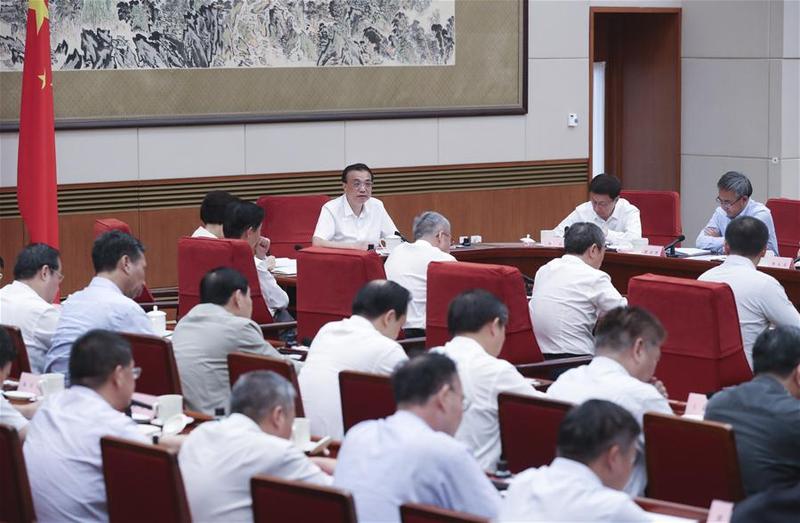



Chinese Premier Li Keqiang has called for more efforts to maintain the steady and healthy development of the economy and society.

Chinese Premier Li Keqiang, also a member of the Standing Committee of the Political Bureau of the Communist Party of China (CPC) Central Committee, chairs a symposium attended by economists and entrepreneurs to analyze the economic situation in Beijing, capital of China, July 15, 2019. Vice Premier Han Zheng, also a member of the Standing Committee of the Political Bureau of the CPC Central Committee, attended the symposium. [Photo/Xinhua]
The Chinese economy has achieved generally steady performance in the first half (H1) of this year with residents' income increasing, the ecological environment improving and some indicators beating expectations, achievements that did not come easily, remarked Li Monday while chairing a symposium attended by economists and entrepreneurs to analyze the economic situation.
The country's GDP expanded 6.3 percent in the first six months of this year, in line with the government's annual target of 6 to 6.5 percent, official data showed Monday.
The attendees agreed that the steady H1 economic performance within an appropriate range showed the Chinese economy's strong resilience as well as the important role of new growth drivers.
They said the cutting of taxes and fees had benefited enterprises and strengthened their confidence, indicating the effectiveness of the government's macro policies.
However, the downward pressure is increasing due to weak global economic recovery, slowing trade and investment, rising protectionism and other headwinds facing the domestic economy, Li pointed out.
China will continue to implement a proactive fiscal policy, a prudent monetary policy and an employment-first policy, while making good use of countercyclical regulation tools and carrying out anticipatory adjustments and fine-tuning when necessary, according to Li.
Efforts should be made to ensure the accomplishment of the annual goal of tax and fee cuts of nearly 2 trillion yuan (about 291 billion U.S. dollars), and improve the transmission mechanism of monetary policy to reduce financing costs for small and micro firms, Li added.
Li called for enhanced efforts at reform and opening-up to build a market-oriented, law-based and international business environment, and turn China into a more attractive investment destination.
He also encouraged domestic firms to innovate further and compete on the global market, while urging big companies to help related small ones grow and the nurturing of more "unicorn firms," "gazelle companies" and other leading market players.
Development of emerging popular consumption markets and new investment drivers should center on improving people's lives, Li said, adding that more quality products and services in old-age care, baby nursing, education and health should be added.
Special local government bonds should be well utilized to facilitate major projects development, Li said.
